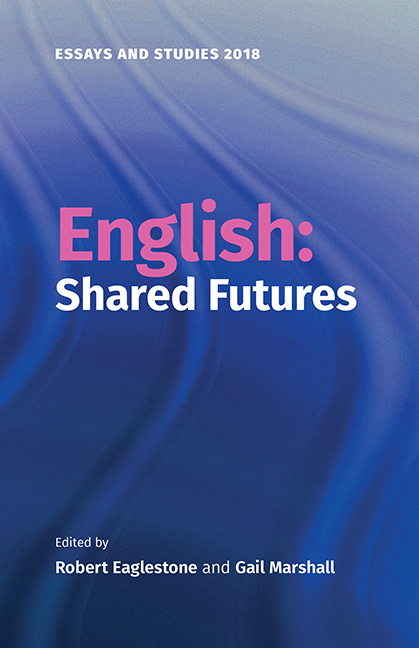Book contents
- Frontmatter
- Contents
- Notes on Contributors
- Acknowledgements
- Abbreviations
- Introduction
- The Changing Picture of School English
- From A-Level to HE: Working Towards a Shared Future?
- English Outreach: Academics in the Classroom
- From Provider to Stager: The Future of Teaching English in HE
- Pedagogic Criticism: An Introduction
- Exquisite Tensions – Narrating the BAME ECA Experience
- Postgraduate Futures: Voices and Views
- Shared Futures: Early Career Academics in English Studies
- Some Reflections on the Funding of English Departments
- English: The Future of Publishing
- Digital Futures
- A View from the United States: The Crisis in the Humanities; the Liberal Arts; and English in the Military Academy
- The Future of Borders
- ‘Between and Across Languages’: Writing in Scotland and Wales
- Exploring Intersections between Creative and Critical Writing: An Interview with Elleke Boehmer
- Integrating English
- Employability in English Studies
- Creative Living: How Creative Writing Courses Help to Prepare for Life-long Careers
- Practice at Large: How Creative Writing can Enhance University Research Environments
- ‘And who can turn away?’ Witnessing a Shared Dystopia
- English and the Public Good
- ‘Can Wisdom be put in a silver rod? / Or Love in a golden bowl?’ On Not Defending the Humanities
- ‘Something Real to Carry Home When Day Is Done’: The Reader in Future
- Afterword
- Index
Exquisite Tensions – Narrating the BAME ECA Experience
Published online by Cambridge University Press: 15 October 2019
- Frontmatter
- Contents
- Notes on Contributors
- Acknowledgements
- Abbreviations
- Introduction
- The Changing Picture of School English
- From A-Level to HE: Working Towards a Shared Future?
- English Outreach: Academics in the Classroom
- From Provider to Stager: The Future of Teaching English in HE
- Pedagogic Criticism: An Introduction
- Exquisite Tensions – Narrating the BAME ECA Experience
- Postgraduate Futures: Voices and Views
- Shared Futures: Early Career Academics in English Studies
- Some Reflections on the Funding of English Departments
- English: The Future of Publishing
- Digital Futures
- A View from the United States: The Crisis in the Humanities; the Liberal Arts; and English in the Military Academy
- The Future of Borders
- ‘Between and Across Languages’: Writing in Scotland and Wales
- Exploring Intersections between Creative and Critical Writing: An Interview with Elleke Boehmer
- Integrating English
- Employability in English Studies
- Creative Living: How Creative Writing Courses Help to Prepare for Life-long Careers
- Practice at Large: How Creative Writing can Enhance University Research Environments
- ‘And who can turn away?’ Witnessing a Shared Dystopia
- English and the Public Good
- ‘Can Wisdom be put in a silver rod? / Or Love in a golden bowl?’ On Not Defending the Humanities
- ‘Something Real to Carry Home When Day Is Done’: The Reader in Future
- Afterword
- Index
Summary
Recent events have initiated both a re-evaluation and, consequently, a re-write of what would otherwise have been a straightforward précis of an uplifting panel session where four academics – at very different stages of our careers – who fall under the BAME (Black and Minority Ethnic) category discussed our experiences. The thread binding us together was – despite our divergent journeys leading there – our work within British universities and, broadly speaking, within English departments. Aside from these commonalities, and the shared experiences and connections once inside the UK academy, we could arguably, present ourselves as a manifesto repudiating the idea of a monolithic BAME experience.
In fact, any conclusion from our initial presentations could be summarised thus:
The BAME experience is not a monolithic one;
The ECA experience is not a monolithic one;
We're all interdisciplinarians now.
To briefly address these points, it is salient to note that the panel was composed of four people, born in three different continents, from different ethnic backgrounds, educational backgrounds, genders, social classes, and, ultimately, different initial experiences of teaching within higher education institutions. If only more English departments were to boast such diversity in their employment practices!
As loosely defined ‘Early Career Academics’, a range of previous employment, including teaching roles, had also preceded our presences on the faculty payroll. And on this note, our wealth of experience meant that we continued to cross disciplines once inside the academy.
The idea of a permanent, secure job within academia is increasingly rare and, as such, expertise has widened. This phenomenon is not limited to BAME staff, of course, but it is also worth taking into account the large subset of BAME staff whose experience of living and being educated outside of the UK has enabled them to more easily reach beyond their immediate areas of expertise within English.
Here I shall divulge further my own peripatetic existence: as a British-educated PhD candidate, sat between the Creative Writing Department at one institution, on the one hand, and the Religions and Philosophies department at a neighbouring institution, on the other, my practice-led research comprising of fiction, Caribbean Pentecostalism and migration straddles disciplines in an atypical manner.
- Type
- Chapter
- Information
- English: Shared Futures , pp. 51 - 56Publisher: Boydell & BrewerPrint publication year: 2018

